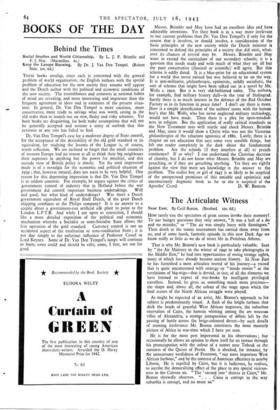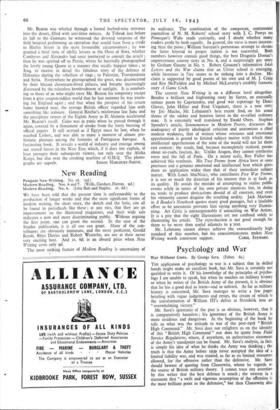The Articulate Witness
Near East. By Cecil Beaton. (Batsford. 125. 6d.) How rarely an the spectators of great scenes invoke their memoryI, To our hungry questions they only answer, " It was a hell of a do and no mistake," or " The air was simply lousy with flamingoes." Then death or the tennis tournament has carried them away from us, and of some harsh, fantastic episode in this new Dark Age we know really as little as we do of street life in Periclean Athens.
That is why Mr. Beaton's new book is particularly valuable. Sent by " the Air Ministry in the winter of 1942 to take photographs in the Middle East," he had rare opportunities of seeing strange sights, many of which have already become ancient history. In Near East he has furnished a most articulate record of his journey—a record that is quite unconcerned with strategy -or " inside stories " or the revelations of big-wigs—that is devoid, in fact, of all the elements we have learned to expect of war-books by intelligent privileged travellers. Instead, he gives us something much more precious— the shape and, above all, the colour of the stage upon which the final scenes of the North African struggle were played.
As might be expected of an artist, Mr. Beaton's approach to his subject is predominantly visual. A flash of the bright turbans that deck the heads of graceful West African negresses, the suburban enervation of Cairo, the hamsin whining among the art nouveau villas of Alexandria, a strange juxtaposition of debris left by the passing of battle across the beige-coloured desert—by such details of seeming irrelevance Mr. Beaton constructs the most masterly picture of Africa in war-time which I have yet seen.
He is for the most part impersonal in his observations ; but occasionally he allows an opinion to show itself for an instant through his preoccupation with the colour of a sunset near Tobruk or the cuteness of the Queen of Persia. He is shocked, for instance, by- the unnecessary sordidness of Freetown' "our most important West African harbour," and by the contrast of American efficiency in nearby Liberia. He is repelled by Cairo, but it is ludicrous, he realises, to ascribe the demoralising effect of the place to any special vicious- ness in the Cairene air. "The second rate' thrives in Cairo," Mr. Beaton shrewdly observes. " . . . Cairo is corrupt in the way suburbia is corrupt, and no more so." Mr. Beaton was whirled through a formal barbed-wire entrance into the desert, filled with anti-litter notices. At Tobruk just before its fall to the Germans he witnessed the devoted surgeons of the field hospital performing an operation that would have been a credit to Harley Street in the most favourable circumstances ; he was granted a brief taste of idyllic leisure at the Oasis of Siwa, whither Cambyses and Alexander had once journeyed to consult the oracle ; then he was spirited off to Persia, where he hurriedly photographed the lovely young Queen in a manner that recalls happier times ; to Iraq, to receive in detail the fabulous story of the defence of Habaniya during the rebellion of 1941 ; to Palestine, Transjordania and Syria. Everywhere he photographed the great, was disconcerted by their blatant chromium-fitted palaces, and became increasingly distressed by the relentless bombardment of sunlight. It is comfort- ing to those of us who might envy Mr. Beaton his temporary escape from a grey coupon-ridden world that by last summer he was yearn- ing for England agair. ; and that when the prospect of his return home loomed near, the average British officer regarded him with something like jealousy. General Ritchie's misfortune last June and the precipitate retreat of the Eighth Army to El Alamein accelerated Mr. Beaton's recall. Cairo was in panic when he passed through it again, covered by a firmament of smoke from the hasty burning of official papers It still seemed as if Egypt must be lost, when he reached Lisbon, and was able to enjoy a moment -of almost pre- historic pleasure among the fantasies of Portuguese baroque. A fascinating book. It reveals a world of industry and courage among our armed forces in the Near East. which, if it does not explain, at least presages their subsequent victory, not only over the Afrika Korps, but also over the creaking machine of G.H.Q. The photo-



























 Previous page
Previous page